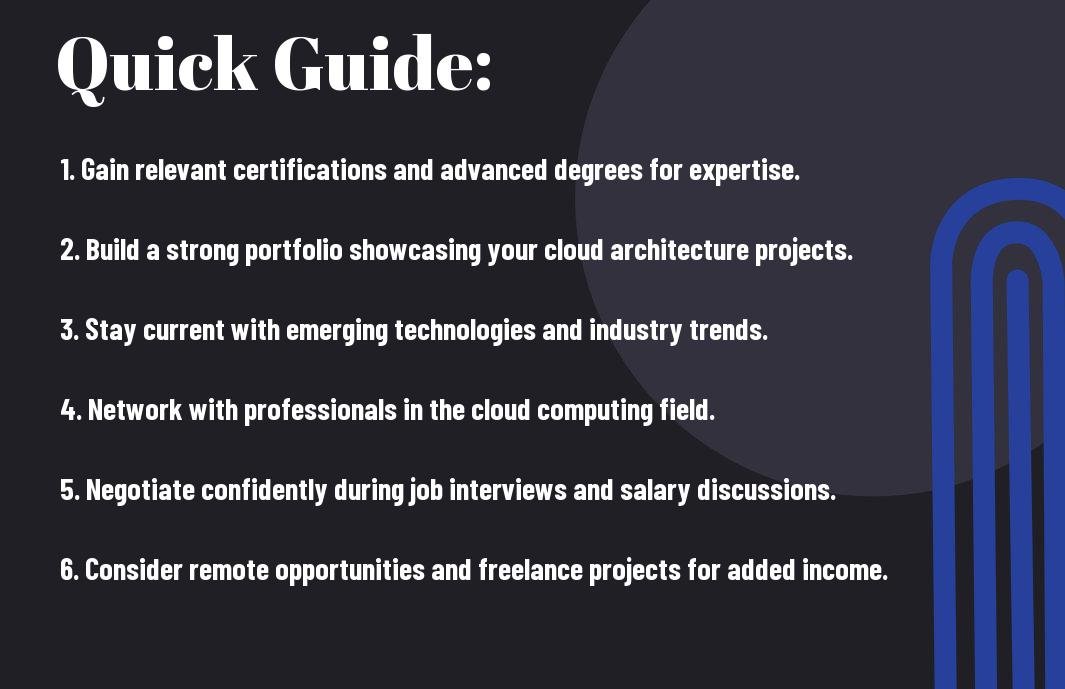Potential cloud architects, are you looking to elevate your career and boost your earning potential in the competitive tech industry? In this comprehensive guide, we will probe into strategies and techniques to maximize your salary potential as a cloud architect. Cloud computing has revolutionized the way businesses operate, and skilled professionals in this field are in high demand. By following the tips and insights provided, you can position yourself as a top candidate and negotiate for a competitive salary package that reflects your expertise and experience.
From acquiring relevant certifications and skills to networking with industry insiders and staying up-to-date with the latest trends, there are numerous steps you can take to enhance your value as a cloud architect. Whether you are just starting out in your career or aiming for a promotion, this guide will equip you with the knowledge and tactics needed to excel in the field of cloud computing and maximize your earning potential as a cloud architect.
Key Takeaways:
- Continuous Learning: Stay updated with the latest cloud technologies and certifications to enhance your value as a Cloud Architect.
- Specialize: Developing expertise in specific cloud platforms like AWS, Azure, or Google Cloud can make you more attractive to potential employers.
- Soft Skills Matter: Communication, problem-solving, and leadership skills are crucial for advancing your career and negotiating higher salaries.
- Networking: Building a strong professional network can provide valuable insights, job opportunities, and mentorship to help you maximize your salary potential.
- Showcase Your Achievements: Highlight your successful projects, cost-saving initiatives, and innovative solutions to demonstrate your value and negotiate higher compensation packages.
- Seek Career Advancement: Look for opportunities to take on leadership roles, lead teams, or oversee large-scale cloud projects to accelerate your career growth and salary potential.
- Stay Agile: Be adaptable to market trends, changes in technology, and evolving job roles to position yourself as a versatile and in-demand Cloud Architect.

Understanding Cloud Architect Roles and Types
If you’re looking to maximize your salary potential as a Cloud Architect, it is crucial to have a clear understanding of the various roles and types within this field. By grasping the important responsibilities and types of Cloud Architect roles, you can better position yourself for success in this rapidly evolving industry. Any ambiguity or lack of knowledge in this area could hinder your career growth and earning potential.
Essential Responsibilities of a Cloud Architect
To excel as a Cloud Architect, individuals must possess a diverse skill set that encompasses technical expertise, strategic planning, problem-solving abilities, and effective communication skills. Additionally, Cloud Architects are responsible for designing and implementing cloud environments to meet the unique needs of their organizations. They must also stay abreast of the latest cloud technologies and trends to ensure their solutions are innovative and efficient.
Types of Cloud Architect Roles
With various types of Cloud Architect roles available in the market, it’s important to understand the distinctions between them. These roles may include Solution Architect, Infrastructure Architect, Security Architect, Enterprise Architect, and DevOps Architect. Perceiving the nuances of each role can help you align your skills and expertise with the right opportunities in the industry.
- Solution Architect
- Infrastructure Architect
- Security Architect
- Enterprise Architect
- DevOps Architect
Perceiving the differences between these Cloud Architect roles can guide you in choosing a specialization that matches your strengths and interests. It is crucial to align your career goals with the specific requirements and responsibilities of each role to maximize your chances of success in the competitive job market.
Cloud Service Models and Their Influence on Architect Roles
An understanding of cloud service models is important for Cloud Architects as it impacts their roles and responsibilities. Whether working with Infrastructure as a Service (IaaS), Platform as a Service (PaaS), or Software as a Service (SaaS), Cloud Architects must adapt their strategies to accommodate the unique characteristics of each service model. By tailoring their solutions to fit the specific requirements of these models, Cloud Architects can enhance the performance and scalability of their cloud environments.
A deep understanding of how cloud service models influence Architect roles is crucial for staying competitive in the field. Cloud Architects must continually educate themselves on the latest developments in cloud technology to ensure they are delivering optimal solutions that meet the evolving needs of their organizations.

Educational Paths and Certifications
Formal Education vs. Self-Learning
To become a successful Cloud Architect, you have two main educational paths to consider: formal education or self-learning. Formal education typically involves pursuing a degree in computer science, information technology, or a related field. This structured approach provides a solid foundation in key concepts and principles that are crucial for a career in cloud architecture. However, it can be time-consuming and expensive.
Self-learning, on the other hand, allows you to customize your learning experience based on your schedule and interests. With the abundance of online resources, tutorials, and courses available, you can acquire the necessary skills at your own pace. While this option offers flexibility, it requires strong discipline and motivation to stay updated with the rapidly evolving cloud technology landscape.
The Most Valuable Certifications for a Cloud Architect
For aspiring Cloud Architects, obtaining relevant certifications is key to demonstrating expertise and staying competitive in the job market. Some of the most valuable certifications include AWS Certified Solutions Architect, Microsoft Certified: Azure Solutions Architect Expert, Google Professional Cloud Architect, and CompTIA Cloud+. These certifications validate your knowledge and skills in specific cloud platforms and technologies, making you an attractive candidate for employers.
Formal certification programs often require passing rigorous exams and completing hands-on projects to ensure that you have a deep understanding of cloud concepts and best practices. Additionally, many certification providers offer resources such as study guides, practice exams, and training courses to help you prepare effectively.
Recertification and Continuing Education
For Cloud Architects, recertification and continuing education are crucial to staying current with industry trends and maintaining your expertise. Most cloud certification programs have expiration dates, requiring you to renew your certification periodically by passing exams or completing professional development activities. By investing time and effort in continuing education, you demonstrate your commitment to excellence and keep your skills sharp in the ever-evolving cloud landscape.
Developing In-Demand Skills and Expertise
Many aspiring cloud architects wonder how they can maximize their salary potential in this rapidly growing field. One key aspect is to develop a robust set of skills and expertise that are in high demand in the industry. By focusing on the right technical and soft skills, as well as exploring valuable specializations, you can significantly boost your earning potential as a cloud architect.
Technical Skills Every Cloud Architect Should Master
Technical skills are the foundation of a successful cloud architect’s career. It is vital to have a deep understanding of cloud computing technologies such as AWS, Azure, Google Cloud, and others. Proficiency in infrastructure as code (IaC) tools like Terraform and CloudFormation, along with experience in containerization platforms like Docker and Kubernetes, is also crucial. Additionally, expertise in networking, security, and database management is highly desirable for cloud architects.
Having a strong grasp of programming languages such as Python, Java, or C# can further enhance your technical capabilities and make you a more versatile and valuable asset to potential employers. Continuous learning and staying updated on the latest trends and advancements in cloud technology are vital to remain competitive in the ever-evolving field of cloud architecture.
Soft Skills That Enhance Your Professional Value
Enhance your professional value as a cloud architect by honing vital soft skills such as communication, problem-solving, and project management. The ability to effectively communicate complex technical concepts to non-technical stakeholders is crucial in this role. Strong problem-solving skills enable you to tackle challenging issues and find innovative solutions, while solid project management skills help you deliver projects on time and within budget.
Cloud architects who possess strong leadership qualities and adaptability are highly sought after in the industry. Leadership skills are vital for guiding teams and driving successful project outcomes, while adaptability allows you to quickly adjust to changes in technology or project requirements. Collaborative skills are also valuable for fostering teamwork and achieving collective goals within an organization.
Specializations that Boost Salary Potential
For cloud architects looking to maximize their salary potential, specializing in high-demand areas can be a game-changer. Specializations such as cloud security, DevOps, big data analytics, or machine learning can significantly increase your market value and earning potential. By becoming an expert in a niche area, you can command higher salaries and stand out in a competitive job market.
A robust specialization coupled with strong technical and soft skills can position you as a top candidate for senior roles and lucrative opportunities in the industry. Continuous learning and gaining certifications in specialized areas can further solidify your expertise and demonstrate your commitment to professional growth as a cloud architect.
Gaining Practical Experience
The Significance of Hands-On Experience
Unlike theoretical knowledge, hands-on experience plays a crucial role in shaping your career as a Cloud Architect. It is through practical application that you master the skills required to design, implement, and maintain cloud infrastructure effectively. Real-world scenarios present challenges that cannot be replicated in a classroom setting, making hands-on experience invaluable.
One of the most critical aspects of hands-on experience is the ability to troubleshoot and problem-solve in real time. This practical knowledge allows you to understand the complexities of cloud environments and develop solutions that are efficient and scalable. Employers highly value candidates with a proven track record of hands-on experience, as it demonstrates their competence and readiness to take on complex projects.
Tips for Acquiring Real-World Experience
Real-world experience can be gained through internships, part-time roles, or personal projects. The key is to seek opportunities that allow you to work directly with cloud technologies and tools. Networking with professionals in the industry can also open doors to hands-on learning opportunities such as mentorship programs or collaborative projects.
The best way to gain real-world experience is to get involved in cloud projects within your current organization or volunteer for non-profit organizations that need assistance with their cloud infrastructure. This not only allows you to apply your skills in a practical setting but also showcases your commitment and dedication to potential employers.
Real-World Experience
- Hands-on experience is invaluable in the field of cloud architecture.
- Networking can provide opportunities for practical learning.
- Engaging in cloud projects showcases commitment to employers.
Job Hunting and Interview Preparation
Despite the competitive nature of the job market, there are several strategies you can employ to maximize your chances of landing a lucrative position as a cloud architect. Job hunting and interview preparation are crucial aspects of this process, and with the right approach, you can set yourself apart from the competition.
Crafting a Winning Resume and Portfolio
Winning in the job market starts with a well-crafted resume and portfolio that highlights your skills and experiences as a cloud architect. Tailor your resume to emphasize relevant certifications, project successes, and technical abilities. Your portfolio should showcase real-world examples of your work, such as case studies, architecture diagrams, and project implementations. Make sure to keep them updated and aligned with the latest industry trends.
Stand out by quantifying your accomplishments and using action verbs to describe your contributions. Employers are looking for candidates who can demonstrate a track record of solving complex problems and delivering results. Additionally, consider including any publications, presentations, or contributions to the cloud community that showcase your expertise and passion for the field.
Leveraging Professional Networks and Job Boards
Preparation is key when utilizing professional networks and job boards to enhance your job search. Joining industry-specific groups on platforms like LinkedIn can provide valuable networking opportunities and insider information on job openings. Make sure to optimize your profile with relevant keywords and a professional summary that highlights your key skills and accomplishments.
This strategic approach can help you connect with industry influencers, recruiters, and potential employers who may not be actively advertising positions. Engage in conversations, share relevant content, and build relationships with professionals in the cloud computing space to expand your network and increase your visibility within the industry.
Mastering the Interview Process
Interview preparation is vital for showcasing your expertise and securing a job offer as a cloud architect. Research the company and the role thoroughly to demonstrate your understanding of their business objectives and how you can contribute to their success. Practice common interview questions related to cloud architecture, infrastructure design, security protocols, and project management.
Be prepared to discuss your technical skills in depth and provide examples of how you have applied them in previous roles. Demonstrate your problem-solving abilities, communication skills, and ability to work in a team environment. Additionally, prepare thoughtful questions to ask the interviewer about the company culture, team dynamics, and growth opportunities to show your interest and commitment to the role.
Understanding the Factors that Influence Salary
After securing a position as a Cloud Architect, the next step is to maximize your earning potential. Understanding the key factors that influence your salary is crucial in achieving this goal. By being aware of these factors, you can strategically position yourself for salary negotiations and career advancement.
- Geographic Location: The city or region where you work plays a significant role in determining your salary as a Cloud Architect. Salaries can vary widely based on the cost of living in different areas.
- Industry and Company Size: The industry you work in and the size of the company can also impact your salary. Tech companies and larger organizations often offer higher salaries and more room for growth.
- Experience and Performance: Your level of experience and performance as a Cloud Architect directly influence your earning potential. Employers value seasoned professionals who have a track record of success in their roles.
Any negotiation regarding your salary should take these factors into account to ensure you receive fair compensation for your skills and expertise.
Geographic Location and Cost of Living
Living in a major tech hub such as Silicon Valley or Seattle can lead to higher salaries due to the high demand for Cloud Architects in these areas. However, the cost of living in these cities is also notably higher, which can offset the higher salary to some extent. On the other hand, working in a smaller city or a region with a lower cost of living may result in a lower salary, but your overall purchasing power could be greater.
When considering job opportunities in different locations, it’s important to factor in not just the base salary but also the cost of housing, transportation, and other living expenses. Ultimately, the goal is to strike a balance between a competitive salary and a manageable cost of living.
Industry and Company Size
Industry and company size are crucial factors that can impact the salary of a Cloud Architect. Tech companies, especially those in the software development and cloud computing sectors, tend to offer higher salaries to attract top talent. Additionally, larger companies with expansive IT infrastructure and complex cloud systems are more likely to compensate Cloud Architects competitively.
that Being aware of the salary trends within your industry and target companies can give you a better understanding of what to expect during salary negotiations. By positioning yourself as a valuable asset with specialized skills and experience, you can command a higher salary and explore opportunities for growth within the organization.
Experience and Performance
On top of geographic location and industry factors, your experience level and performance as a Cloud Architect are significant determinants of your salary. Professionals with several years of experience and a proven track record of successful cloud implementations and optimizations are highly sought after in the job market.
Plus, Continuously improving your skills, staying updated on the latest industry trends, and delivering exceptional results can lead to salary increments, promotions, and other opportunities for career advancement as a Cloud Architect.
Negotiating Your Salary and Benefits Package
All successful professionals know that negotiating your salary and benefits package is a crucial step in maximizing your earnings as a Cloud Architect. In this chapter, we will discuss strategies to help you secure the best compensation package possible.
Researching Competitive Salary Rates
Salary research is the first step in negotiating a competitive compensation package. Look into industry reports, online resources, and professional networks to understand the current market rates for Cloud Architects. This information will empower you to make informed decisions during salary negotiations and ensure you are not undervaluing your skills and experience.
Keep in mind that salary rates can vary based on factors such as location, company size, and demand for Cloud Architects. By gathering data and benchmarking your salary expectations, you can enter negotiations with confidence and a clear understanding of your worth in the market.
Evaluating and Negotiating Benefits Beyond the Paycheck
Evaluating your benefits package is just as important as negotiating your salary. While a high salary is undoubtedly appealing, don’t overlook the value of benefits such as healthcare, retirement plans, flexible work arrangements, and professional development opportunities. These perks can significantly impact your overall job satisfaction and financial well-being.
During negotiations, don’t hesitate to advocate for additional benefits or perks that are important to you. Company culture, work-life balance, and growth opportunities are all factors that can enhance your overall compensation package and make a compelling case for why you are a valuable asset to the organization.
Competitive benefits packages can set you apart from other candidates and position you as a top talent in the field. Be sure to thoroughly review and understand the benefits being offered, and consider how they align with your personal and professional goals. Do not forget, a comprehensive benefits package can contribute to your long-term success and job satisfaction as a Cloud Architect.
The Art of Salary Negotiation
Retirement plans are a key component of a comprehensive benefits package, and understanding your options is crucial in negotiating your salary as a Cloud Architect. Employers may offer 401(k) plans, pension plans, or other retirement savings vehicles as part of their benefits package. Consider the employer’s contribution match, vesting schedule, and investment options when evaluating these benefits.
When negotiating your salary, don’t overlook the importance of retirement planning. Securing a solid retirement plan early in your career can have a significant impact on your financial future. Take the time to explore and understand your options, and advocate for a package that sets you up for long-term financial success as a Cloud Architect.
Climbing the Career Ladder
Now that you’ve established yourself as a Cloud Architect, it’s time to focus on climbing the career ladder to maximize your salary potential. Advancing in your career requires a strategic approach that includes mentorship, professional networking, and a clear roadmap for progression.
The Importance of Mentorship and Professional Networking
Career mentorship plays a crucial role in the development of any professional. Having a mentor who is experienced in the field can provide invaluable guidance, insights, and advice to help you navigate the challenges and opportunities that come with advancing in your career. Seek out mentors within your organization or industry who can offer support and help you broaden your perspective.
Professional networking is another imperative component of career growth. Building relationships with peers, industry leaders, and potential employers can open doors to new opportunities, collaborations, and insights. Attend industry events, join professional organizations, and engage with online communities to expand your network and stay current with industry trends.
Step-by-step Strategies for Advancing Your Career
| 1. Set Clear Goals | 2. Continuous Learning |
| Define your long-term career objectives and break them down into actionable steps to track your progress. | Stay updated with the latest cloud technologies, certifications, and trends to enhance your skills and stay competitive. |
Climbing the career ladder as a Cloud Architect requires proactive planning and execution of strategic steps to advance your position and salary potential. By setting clear goals, investing in continuous learning, seeking mentorship, and expanding your professional network, you can position yourself for success in the rapidly evolving cloud technology landscape.
Staying Ahead of the Curve
Not only is becoming a successful Cloud Architect about landing a great job now, but it’s also about building a sustainable career that grows with the ever-evolving industry. Staying ahead of the curve and continuously enhancing your skills and knowledge is key to maximizing your salary potential in this competitive field.
Trends and Innovations in Cloud Computing
Computing trends and innovations in cloud technology are constantly emerging, shaping the way organizations operate and how architects design solutions. Keeping abreast of these developments is crucial for cloud architects to remain relevant and offer cutting-edge solutions to their clients.
Cloud computing is rapidly evolving with advancements in areas such as serverless computing, edge computing, multi-cloud strategies, and containerization. Understanding these trends and incorporating them into your skill set can set you apart as a forward-thinking and adaptable cloud architect.
Continuous Learning and Adaptation
Staying ahead in the field of cloud architecture requires a commitment to continuous learning and adaptation. With technology evolving at a rapid pace, architects must be proactive in upskilling themselves to stay relevant and competitive in the market.
This means dedicating time to learning new technologies, earning certifications, attending industry conferences, and actively participating in relevant communities to stay informed about the latest trends and best practices.
Pros and Cons of Specialization vs. Broad Expertise
| Pros | Pros |
| Deep knowledge in a specific area | Ability to work across multiple platforms |
| Cons | Cons |
| Potential pigeonholing into one technology | Risk of spreading oneself too thin |
| Important Details | Important Details |
| Specialists are highly sought after | Generalists can adapt to different project requirements |
Trends in the cloud computing industry indicate a preference for specialists in niche technologies, but broad expertise can provide architects with versatility in handling diverse projects and challenges.
Final Words
So, now that you have this comprehensive guide on how to maximize your salary potential as a Cloud Architect, it’s time to put these strategies into action. By staying up-to-date with the latest cloud technologies, obtaining relevant certifications, gaining practical experience through projects, and negotiating effectively with potential employers, you can significantly increase your earning potential in this high-demand field. Bear in mind, continuous learning and professional development are key to advancing your career and securing top-paying positions in the cloud computing industry.
For more insights on cloud computing salaries and trends, check out Cloud Computing Salary: Your 2024 Guide. This resource can provide you with valuable information to help you make informed decisions about your career path and salary expectations as a Cloud Architect.
FAQ
Q: What is a Cloud Architect?
A: A Cloud Architect is a professional responsible for overseeing a company’s cloud computing strategy. They design, plan, and manage the organization’s cloud infrastructure to ensure it meets their needs and goals.
Q: What are the key skills needed to become a successful Cloud Architect?
A: To excel as a Cloud Architect, you need strong knowledge of cloud platforms, programming languages, networking, security, and experience with cloud migration and deployment.
Q: How can I maximize my salary potential as a Cloud Architect?
A: To maximize your salary potential as a Cloud Architect, focus on acquiring in-demand certifications, gaining hands-on experience through projects, and continuously updating your skills to stay current with the latest trends in cloud computing.
Q: Which certifications are recommended for Cloud Architects?
A: Certifications such as AWS Certified Solutions Architect, Google Professional Cloud Architect, and Microsoft Certified: Azure Solutions Architect are highly recommended for Cloud Architects looking to enhance their skills and increase their earning potential.
Q: What are the typical career paths for Cloud Architects?
A: Cloud Architects can progress to roles such as Cloud Security Specialist, Cloud Infrastructure Manager, Cloud Solutions Architect, or even Chief Technology Officer (CTO) as they gain experience and expertise in the field.
Q: How important is hands-on experience for Cloud Architects?
A: Hands-on experience is crucial for Cloud Architects as it allows them to apply theoretical knowledge in real-world scenarios, troubleshoot issues, and develop practical solutions that meet the organization’s needs effectively.
Q: What strategies can Cloud Architects implement to stay competitive in the job market?
A: To stay competitive, Cloud Architects should continuously upskill themselves, build a strong professional network, showcase their expertise through blogs or speaking engagements, and always be on the lookout for new opportunities to expand their knowledge and experience.







